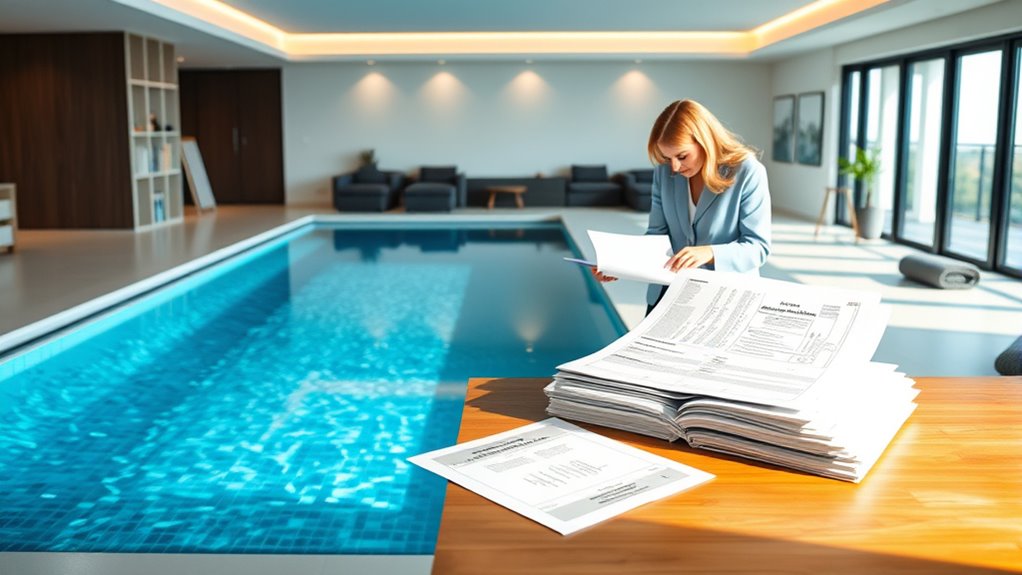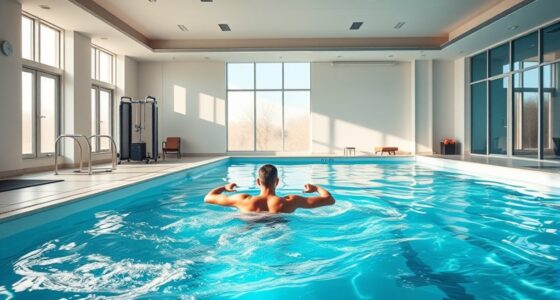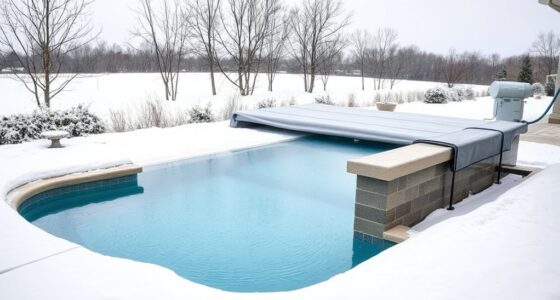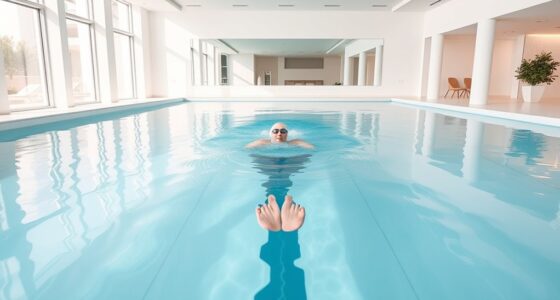Before installing an endless pool, you need to check local zoning laws, obtain building permits, and verify compliance with setback and height restrictions. You must also meet electrical and plumbing codes, follow water use regulations, and consider HOA guidelines. Regular inspections and permits are essential to stay in compliance over time. Knowing these rules early helps avoid fines or removal orders. If you continue exploring, you’ll find detailed steps to keep everything legal and safe.
Key Takeaways
- Check local zoning laws and obtain any necessary variances for pool installation.
- Secure building permits by submitting detailed plans and complying with local codes.
- Verify setback and height restrictions to ensure proper placement and avoid violations.
- Ensure electrical and plumbing work meet safety standards with licensed professionals.
- Keep records of inspections and maintenance to maintain compliance and prevent legal issues.
Understanding Local Zoning Regulations

Understanding local zoning regulations is essential because they directly impact what you can build or modify on your property. Before starting your endless pool project, check your zoning laws to see if pools are allowed and where they can be placed. Some zones have restrictions on pool setbacks, height, or size, which could limit your options. You might also need to take into account whether your property is in a residential, commercial, or mixed-use zone, as rules vary. Failing to comply can lead to fines or having to remove your pool later. Contact your local zoning office or review their website to find specific guidelines. Doing this groundwork early ensures your project stays on track and avoids unnecessary legal issues. Additionally, understanding industry trends can help you anticipate future zoning changes that might affect your pool installation.
Obtaining Building Permits for Your Pool

Are you aware of the specific building permits required before installing your pool? Securing the correct permits is essential to avoid fines, delays, or legal issues. Start by visiting your local building department’s website or office to understand the application process. You’ll typically need to submit detailed plans that show the pool’s size, location, and safety features. Some jurisdictions require inspections during different construction phases. Be prepared to pay permit fees and provide proof of compliance with local codes. Applying early guarantees you have ample time for approval before installation begins. Remember, each area’s requirements vary, so checking with your local authority is the best way to ensure you’re fully compliant and ready to enjoy your new endless pool. Additionally, understanding building code compliance can help streamline the approval process and prevent costly modifications later.
Compliance With Setback and Height Restrictions
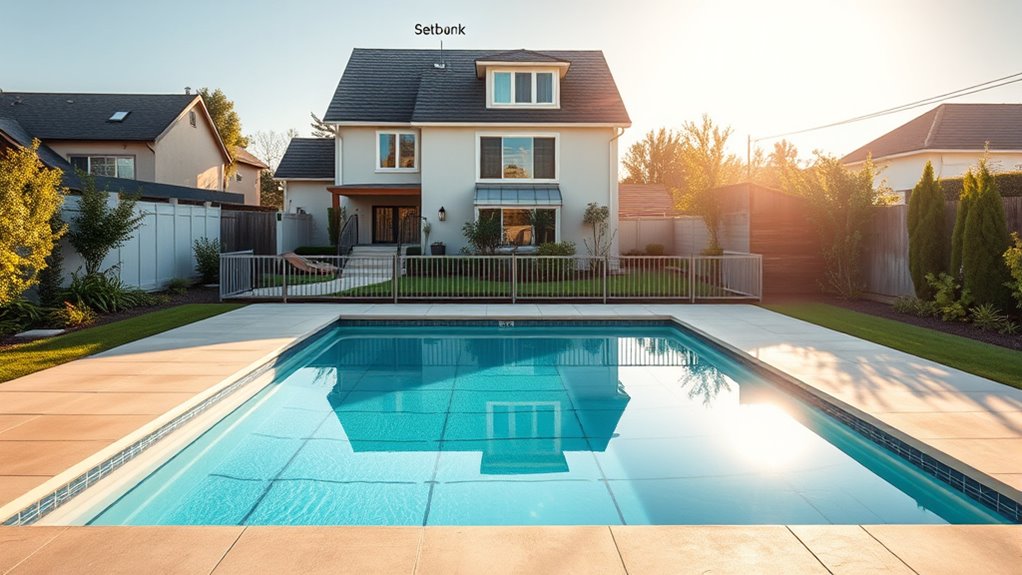
You need to understand the setback distance regulations to guarantee your pool complies with local rules. Maximum pool height limits also play a role in avoiding violations. If your plans don’t fit within these restrictions, local zoning variances might be necessary to move forward. Additionally, consulting local building codes can help ensure your installation aligns with construction standards and safety requirements.
Setback Distance Regulations
Setback distance regulations are designed to guarantee structures are positioned safely and harmoniously within a property. These rules specify how far your endless pool must be from property lines, buildings, and other structures. Local codes aim to prevent conflicts with neighboring properties, ensure privacy, and promote safety. You’ll need to measure and verify these distances before installation. Failing to comply can result in fines, removal orders, or the need for modifications. Check your city or county zoning ordinances for specific setback requirements, which vary widely depending on your location and property type. It’s essential to consult with local authorities or a professional installer to confirm your plans meet all setback regulations. Proper setback measurements can help you avoid potential violations and ensure your pool installation is legal, safe, and respects community standards.
Maximum Pool Height Limits
How high can your pool legally be? It depends on local building codes and zoning regulations. Most jurisdictions specify maximum height limits to guarantee safety and neighborhood aesthetics. Typically, the maximum height for an above-ground or in-ground pool is around 4 to 6 feet, but some areas may allow taller structures with proper permits. These limits often apply to the pool’s tallest point, including any decking or fencing attached. Exceeding height restrictions can lead to fines or the need to modify your installation. Always check your local building department’s guidelines before planning your pool’s height. Staying within these limits helps you avoid violations and ensures your pool installation remains compliant with all safety standards and regulations. Additionally, understanding setback requirements can help determine how close your pool can be to property lines or structures.
Local Zoning Variances
Local zoning variances offer a way to address restrictions on pool height and setbacks when standard regulations pose challenges. If your property’s setbacks or height limits make installation difficult, applying for a variance can grant you temporary or permanent relief. To qualify, you’ll need to demonstrate that strict adherence causes unnecessary hardship or that your pool won’t negatively impact neighbors or the community. The application process typically involves submitting a formal request to your local zoning board, providing supporting documentation, and attending a public hearing. Approval isn’t guaranteed, but if granted, it allows you to proceed with your pool installation while complying with the specific conditions set by the variance. Always review your local zoning laws and consult authorities before pursuing a variance to ensure a smooth process. Additionally, understanding local legal requirements can help you better navigate the approval process.
Electrical and Plumbing Code Requirements
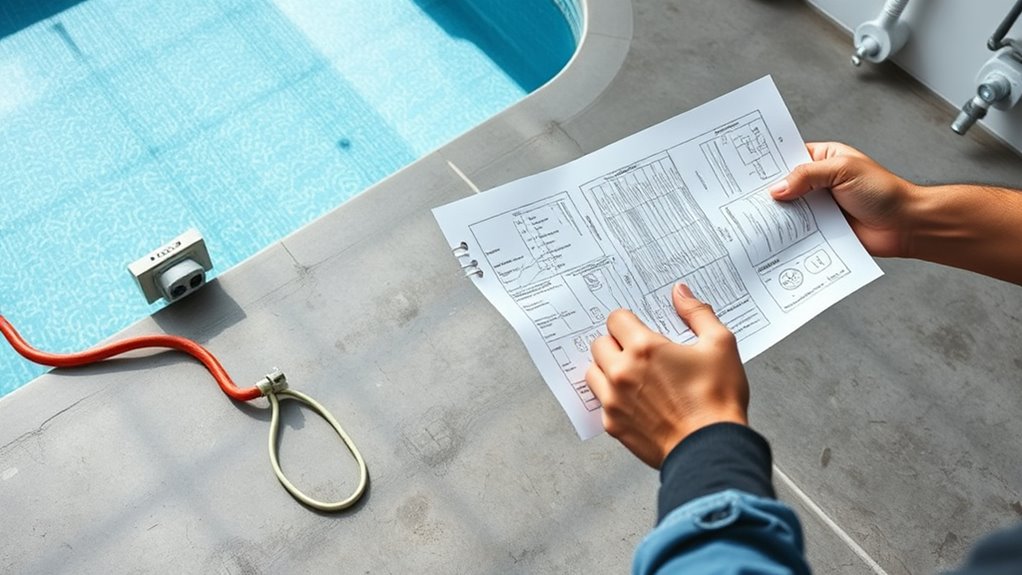
When working on your project, you need to guarantee your electrical systems meet code requirements for safety and efficiency. Proper plumbing installation standards are essential to prevent leaks and comply with regulations. Staying informed about these codes helps you avoid costly violations and ensures everything functions smoothly. Additionally, understanding local building codes related to plumbing and electrical systems can further ensure compliance and safety.
Electrical System Compliance
Ensuring your electrical system meets code requirements is essential for safety and compliance. You need to verify that your setup follows local electrical codes, including proper grounding, GFCI outlets, and circuit breakers rated for outdoor use. The electrical panel should be accessible and correctly labeled. Wiring must be done by a licensed electrician, following the manufacturer’s specifications and safety standards. Here’s a quick overview of key requirements:
| Requirement | Description | Responsible Party |
|---|---|---|
| GFCI Protection | Install Ground Fault Circuit Interrupters | Licensed Electrician |
| Circuit Rating | Use dedicated, outdoor-rated circuits | Electrician |
| Proper Grounding | Ensure grounding meets code standards | Licensed Electrician |
| Accessibility | Panel must be accessible and labeled | Homeowner/Electrician |
| Inspection | Obtain approval before use | Local Authority |
Additionally, verifying that your electrical setup is compliant with electrical and plumbing code requirements helps prevent future issues.
Plumbing Installation Standards
Proper plumbing installation is essential for safety, efficiency, and code compliance in any project. When installing your Endless Pool, you need to follow specific plumbing standards outlined by local codes. This includes using approved materials, correct pipe sizing, and secure fittings to prevent leaks. You should also ensure proper drainage and venting to avoid water backup and sewer gases. All plumbing work must meet the requirements of the plumbing code, which may specify pressure tests and inspections before covering the lines. Additionally, your installation should include accessible shut-off valves and backflow prevention devices. Failing to comply can result in costly repairs, safety hazards, or failure to obtain necessary permits. Always consult local plumbing codes and work with licensed professionals to ensure your installation meets all standards. Being aware of Pinball Machine Weights can also help in planning the logistics for your installation site, especially if heavy equipment needs to be moved or installed safely.
Environmental and Water Use Regulations
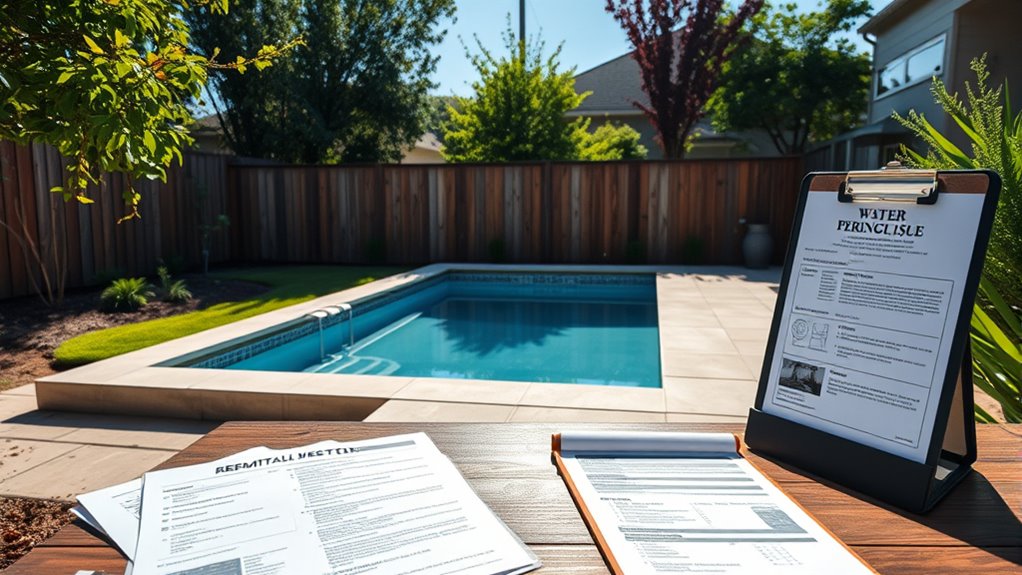
Environmental and water use regulations set essential standards to safeguard natural resources and guarantee sustainable development. Before installing your endless pool, you need to understand how these rules impact your project. First, check local water restrictions, which may limit pool filling or refilling times to conserve resources. Second, ensure your installation complies with wastewater disposal laws to prevent contamination. Third, verify that your water source meets quality standards to avoid environmental harm. Fourth, consider energy efficiency requirements that aim to reduce water and electricity consumption. Additionally, understanding field recording techniques can help you monitor water quality effectively through proper sampling methods. By following these regulations, you help protect the environment and stay within legal boundaries. Ignoring these rules can lead to fines, project delays, or environmental harm, so always consult local authorities before proceeding.
HOA Guidelines and Community Restrictions

Are you aware of how HOA guidelines and community restrictions can affect your pool installation? Many homeowners overlook these rules, risking fines or having to remove your new endless pool. It’s vital to review your HOA’s covenants, conditions, and restrictions (CC&Rs) before planning your project. Some HOAs may limit pool size, height, or placement, or require approval processes. To clarify, here’s a quick overview:
| Restriction Type | Possible Limitation |
|---|---|
| Size | Maximum dimensions or volume |
| Location | Setback distances or proximity to property lines |
| Aesthetics | Pool design, fencing, or landscaping requirements |
Always check your HOA’s rules early to avoid surprises and ensure compliance.
Inspection and Approval Processes

Before you can enjoy your new pool, you’ll need to navigate the inspection and approval processes required by local authorities and possibly your HOA. These steps ensure your installation meets safety and code standards. Typically, you’ll need to:
Before enjoying your pool, complete local inspections and approvals for safety and compliance.
- Submit detailed plans and permits to local building departments.
- Schedule inspections at different phases—foundation, electrical, and final installation.
- Address any issues or corrections identified during inspections.
- Obtain official approval before filling and using your pool.
These procedures help verify that your pool complies with zoning, safety, and construction codes. Skipping or rushing through inspections can lead to fines, delays, or the need to dismantle your pool. Following the correct process guarantees a smooth, stress-free installation.
Maintaining Permits and Staying Compliant Over Time
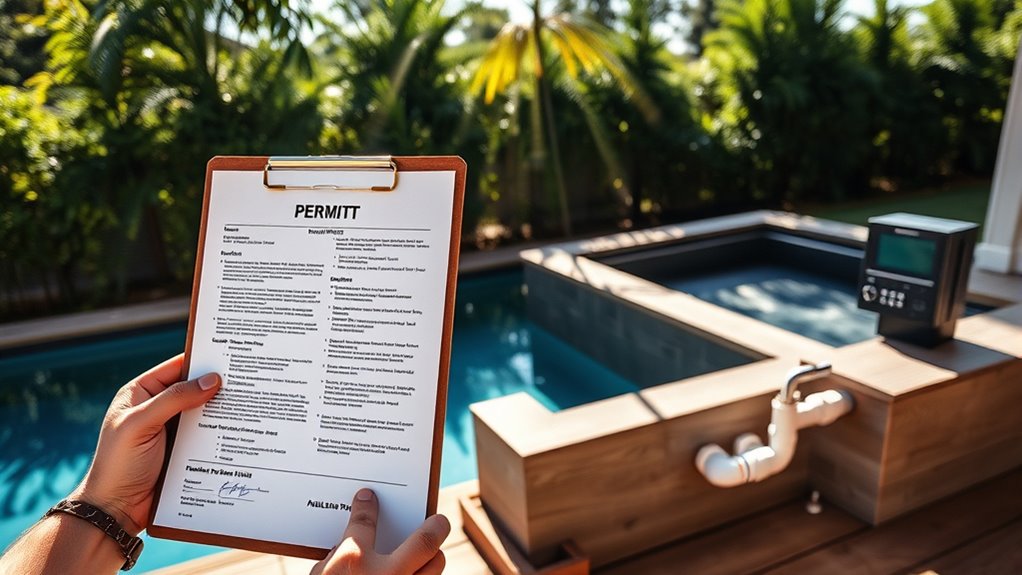
Once your pool is installed and permits are approved, staying compliant over time requires ongoing attention to regulations and maintenance requirements. You should regularly review local building codes and safety standards to ensure your pool remains compliant. Keep detailed records of inspections, maintenance, and any repairs. Schedule routine checks for proper operation of safety features, like covers and alarms. Stay current with any updates to permits or regulations, submitting renewal applications as needed. Maintaining proper documentation can help you avoid fines or legal issues. Additionally, keep your pool well-maintained—clean filters, check water chemistry, and ensure equipment functions correctly. By staying proactive, you can enjoy your endless pool safely and avoid costly violations or permit issues down the line.
Frequently Asked Questions
How Long Does the Permit Approval Process Usually Take?
The permit approval process usually takes around two to four weeks, but it can vary depending on your local government and the complexity of your project. You should submit all required documents promptly and follow up regularly. To avoid delays, make certain your application is complete, accurate, and meets all local codes. Planning ahead helps you get approval faster so you can enjoy your endless pool sooner.
Are There Specific Permits for Indoor vs. Outdoor Installations?
Yes, there are different permits for indoor and outdoor installations. For outdoor pools, you typically need a building permit and possibly a zoning clearance, depending on your local regulations. Indoor pools may require permits related to electrical, ventilation, and structural modifications. Always check with your local authorities to guarantee you get the right permits for your specific installation, as requirements can vary considerably based on location and setup.
Can Permits Be Transferred if I Sell My Property?
Permits typically don’t transfer when you sell your property. You’ll need to notify the new owner about existing permits and verify they’re aware of any ongoing obligations. It’s wise to review local laws, liaise with authorities, and clarify permit responsibilities before closing. Doing so avoids future fiascos, fosters transparency, and ensures the endless pool’s proper, permitted use. Always double-check with local officials to confirm specific rules and procedures.
What Are the Common Reasons Permits Get Denied?
Permits often get denied because of incomplete or inaccurate applications, missing documentation, or failure to meet local building codes. You might also face denial if your property doesn’t comply with zoning restrictions or if the proposed project poses safety concerns. To avoid this, double-check all requirements, provide thorough documentation, and consult local authorities early to guarantee your plan aligns with regulations, increasing the chances of permit approval.
Are There Hidden Costs Beyond the Permit Fees?
Yes, there can be hidden costs beyond permit fees. You might encounter expenses for site preparation, such as leveling the ground or removing obstacles. Additional costs may include inspections, utility upgrades, or necessary safety features like fencing and covers. Always budget extra for unexpected issues, permits, or code compliance upgrades. Planning ahead helps avoid surprises and guarantees your endless pool installation stays within your budget.
Conclusion
As you finalize your endless pool installation, picture yourself stepping into a tranquil oasis, where every permit and code is in perfect harmony. The clear blue water reflects your careful planning, while the surrounding landscape stands approved and compliant. By staying informed and following regulations, you guarantee this serene retreat remains a beautiful, safe space for years to come. Your backyard oasis isn’t just a dream — it’s a perfectly permitted, peaceful haven.
